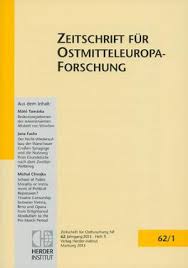„... die Litauer haben den Polen sehr viel Schlechtes gebracht". Ethnisch-national geprägte Ordnungskonstruktionen in Vilnius während des Zweiten Weltkriegs
"The Lithuanians did the Poles a lot of wrong". Ethnic-national concepts of order in Vilnius during World War II
Author(s): Christiane ToppSubject(s): Jewish studies, Ethnohistory, Military history, Political history, WW II and following years (1940 - 1949), Inter-Ethnic Relations
Published by: Verlag Herder-Institut
Keywords: Lithuanians; Poles; Ethnic-national concepts; Vilnius; World War II;
Summary/Abstract: This article is aimed at pointing out the significance of World War II for social relations within the ethnically heterogeneous city of Vilnius. It is mainly focused on the Polish and the Lithuanian population. Motivated by the conflict between Poland and Lithuania about the Status of the city and the region, these two groups were strongly opposed since the mass influx of Lithuanians into the city, which had previously been inhabited primarily by Poles and Jews, in 1939. After the brief Soviet and the following three-year German occupation in 1944, we can see changes in the mutual perception of the Polish and the Lithuanian population. The reasons for this can be found in the specific, regional System of German government: It made use of the interethnic divisions that had already existed before the war and increased them, forcing violence and demanding mass murder, especially against the Jewish population. Due to a lack of personnel the commissioners of the German occupational institutions, in line with their racist ideology, recruited a large number of Lithuanian support staff. These partly used their position within the regime to achieve their own objectives. This becomes especially obvious in the context of interethnic struggles: Regularly, members of non-Lithuanian ethnic groups, especially Poles, were attacked. In doing so, the Lithuanian support personnel did not at all act according to Instructions. In some cases, they even openly confronted the German authorities, whose interest was to keep the population living outside the Jewish ghettos calm. In cases of Lithuanian assaults, Poles and others sometimes asked Germans for help. But the occupying forces never managed to put an end to these arbitrary acts on the Lithuanian side. Owing to their position at the intersection between occupants and the occupied, their presence in the city and their authority, the Lithuanian support personnel often seem to have been perceived by members of other ethnic groups as "the" Lithuanian as such. The changed view of "Lithuanians", particularly among the Polish population, which becomes apparent in the sources after 1944, gives proof of this. Though it is not possible to make any quantifying Statements, we can see that the condescendence towards "Lithuanians", as often found before 1939, gave way to fear. Now, they were considered serious enemies.
Journal: Zeitschrift für Ostmitteleuropa-Forschung
- Issue Year: 56/2007
- Issue No: 3
- Page Range: 364-388
- Page Count: 25
- Language: German

